Key Takeaways: PIA vs ExpressVPN
- The main difference between ExpressVPN and PIA is that ExpressVPN delivers an excellent all-around performance, whereas PIA has slower speeds and can’t unblock some streaming platforms.
- ExpressVPN is the best pick if you need a VPN for streaming, gaming, torrenting, bypassing censorship and virtually any other online activity.
- Private Internet Access is cheaper than ExpressVPN and offers unlimited simultaneous connections and dedicated IP addresses.
ExpressVPN and Private Internet Access (PIA) are both reliable VPNs: The former ranks as our pick for the best VPN, whereas the latter is an affordable mid-tier option (read our best VPN guide). In this ExpressVPN vs PIA comparison, we’ll look beyond the superficial differences and reveal intricate details about their features, performance and pricing to help you make a more informed decision.
Our guide comes off the back of rigorous testing. We put both VPN services through the wringer, and in this guide, we’ll compare the results side-by-side on various fronts. We’ll tell you how they compare on streaming, speed, security, privacy, server locations and more. Read on for the nitty-gritty details.
-
09/05/2022
Updated the comparison to include the latest VPN speed data.
-
07/24/2023 Facts checked
We rewrote the guide to include fresh details about ExpressVPN and Private Internet Access’ performance, new features and a new condensed article format.
How Did We Rate ExpressVPN vs PIA
For this comparison, we’ll examine the similarities and differences between ExpressVPN and Private Internet Access. The similarities are helpful to know about, but it’s the differences that will ultimately help you make your decision.
We’ve reviewed a lot of VPNs, putting them through rigorous real-world testing in a variety of categories. As such, we’re expertly positioned to compare these two, and help you flesh out which is the right pick.
-
1
- : PayPal, Credit card, Bitcoin, PaymentWall
- : 5
- :
- :
- :
- :
Average speedDownload Speed91 MbpsUpload Speed9 MbpsLatency4 ms -
2
- : PayPal, Credit card
- : Unlimited
- :
- :
- :
- :
Average speedDownload Speed91 MbpsUpload Speed9 MbpsLatency3 ms
PIA vs ExpressVPN: Similarities & Differences
ExpressVPN is the better VPN overall, but that doesn’t mean Private Internet Access is a fly-by-night service. On the contrary, PIA is great in its own right and might be the better bet depending on your needs. To help you pick, we’ve broken down the subtleties and other characteristics to help you compare.
| $6.66 / month(All Plans) 30-days money-back guarantee | $2.19 / month(All Plans) 30-days money-back guarantee | |
| Review | Review | |
| Payment methods | PayPal, Credit card, Bitcoin, PaymentWall | PayPal, Credit card |
| Accepts cryptocurrency | ||
| Simultaneous connections | 5 | Unlimited |
| Supports split tunneling | ||
| Unlimited bandwidth | ||
| Free trial available | 7 days (mobile only) | Only on Android/iOS apps |
| Refund period | ||
| Worldwide server amount | 3,000+ servers in 94 countries | servers in 78 countries (no exact data) |
| Desktop OSes | Windows, MacOS, Linux | Windows, MacOS, Linux |
| Mobile OSes | Android, iOS | Android, iOS |
| Browser extensions | Chrome, Firefox, Edge | Chrome, Firefox, Opera |
| Can be installed on routers | ||
| Can access Netflix US | ||
| Can access BBC iPlayer | ||
| Can access Hulu | ||
| Can access Amazon Prime Video | ||
| Encryption types | 256-AES, ChaCha20 | 128-AES, 256-AES |
| VPN protocols available | OpenVPN, IKEv2, Lightway | IPSec, OpenVPN, WireGuard |
| Enabled at device startup | ||
| Allows torrenting | ||
| No-logging policy | ||
| Passed DNS leak test | ||
| Killswitch available | ||
| Malware/ad blocker included | ||
| Live Chat | 24/7 | 24/7 |
| Email support | 24/7 | 24/7 |
| Phone support | ||
| User forum | ||
| Knowledgebase |
Similarities
Before we get into areas where ExpressVPN and Private Internet Access differ, let’s reveal the categories where they overlap.
Device Compatibility

User-Friendliness
PIA and ExpressVPN’s mobile apps boast sleek and well-organized user interfaces (UI), with a large connection button and details about your connection. PIA VPN offers a “quick settings” section on the mobile app, which enables you to quickly access key features from the home tab.
Beyond that, both VPNs are similarly easy to use on Windows and Mac devices. Unsurprisingly, both providers made it onto our list of the best VPNs for beginners.

mobile and desktop apps.
That said, the PIA app is tied to the tray in Windows, and a click outside the app closes it. This might not be problematic with extended connections, but if you constantly switch servers, accessing the app via the system tray can be a hassle.
Money-Back Guarantee & Free Trial
Both PIA and ExpressVPN offer a seven-day free trial on Android and iOS mobile devices. If you need to test the apps on a desktop, the 30-day money-back guarantee is your best bet.
Keep in mind that the money-back guarantee isn’t a traditional free trial. While it gives you ample time to tinker with the app’s features risk-free, you’ll still be charged. However, if you cancel the subscription within 30 days, you’ll get a full refund (learn how on our ExpressVPN refund guide).
Customer Support
Both ExpressVPN and Private Internet Access offer excellent customer service. If you fancy a self-service support option, you’ll be glad to know the two providers’ knowledgebases provide helpful articles and guides.
However, if you have an urgent issue that requires a human touch, the live chat is your first port of call. We used both live chat channels, and the support agents answered our questions within a minute.
Sadly, some of the PIA agents don’t seem well-versed on all VPN topics, and we were not impressed with the half-baked responses we got. Thankfully, ExpressVPN support agents were very knowledgeable and quickly responded to our queries with satisfactory answers.

Beyond these options, Private Internet Access and ExpressVPN offer email support. PIA also provides a ticket-based support system. Sadly, neither VPN service provides a user forum or phone support options.
Differences
With the similarities out of the way, it’s time to focus on the things that set these VPN services apart.
Connection Speed
Every VPN slows your internet speeds down to a certain degree because of encryption and the fact that your traffic goes through the VPN server. However, the fastest VPN services ensure the impact is negligible — ExpressVPN is a good case in point.
Upload Speed (Higher is better)
Latency (Lower is better)
Even though NordVPN has edged it out on the speed front, ExpressVPN is still a force to be reckoned with. It delivers consistently fast download and upload speeds, whether you’re connecting to a nearby server or one several continents away.
Whether you want to circumvent sporting blackouts in the U.S. or watch full HD and 4K movies on streaming services abroad, ExpressVPN delivers interruption-free performance. It’s the best VPN gaming, torrenting (read our best VPN for torrenting guide) and other speed-intensive activities.
The same can’t be said about Private Internet Access. While its overall performance is admirable, it’s in its element when connecting to nearby servers. In that case, it delivers fast upload speeds and serviceable download speeds. However, PIA’s download speeds can be sluggish when connecting to servers that are farther away.
Streaming Performance
We measure VPN streaming performance by testing connection speeds and unblocking ability. The latter is the linchpin, because before you can even stream movies or TV shows, you have to find a way around geoblocks.
ExpressVPN has shown time and again that it’s the best VPN for streaming, thanks to its excellent unblocking ability. During our testing, the VPN unblocked Nextlix, Max, BBC iPlayer, Hulu and Amazon Prime Video on the first attempt. This, coupled with its fast and consistent speeds, makes it a streaming maven.
Private Internet Access plays catch up on this front — its unblocking ability is a mixed bag. While it easily unblocks Netflix and Amazon Prime Video, it doesn’t work with BBC iPlayer and Hulu. Considering its sluggish international download speeds, PIA ticks the box only if you need a VPN to stream movies and TV shows on local libraries using unsecure networks.
It can also be helpful if you need to bypass sporting blackouts or ISP throttling, where your internet provider slows down your connection when they notice you’re engaging in a bandwidth-intensive activity.
Smart DNS Services

Roku, Chromecast and smart TVs.
Both PIA and ExpressVPN have smart DNS services for streaming devices that don’t support native VPN apps, such as older Samsung and LG smart TVs.
ExpressVPN’s Mediastreamer offers U.K. and U.S. IP addresses, meaning you can access streaming services in those two countries. On the other hand, PIA’s smart DNS lets you access streaming services in the U.K., the U.S., Germany, the Netherlands and Japan.
Beyond the smart DNS, PIA offers port forwarding. This feature lets you route inbound traffic through a predefined port on a VPN server to bypass the NAT firewall. Doing so improves VPN performance when streaming, torrenting and gaming.
Security Features
VPN protocols and encryption standards form the basis of VPN security, but there are other features to consider, too. Let’s dive into the details.
Protocols

VPN protocols and encryption standards.
Both VPNs support OpenVPN on mobile and desktop, an industry-standard, open-source protocol that has withstood the test of time.
Beyond that, both services have adopted modern protocols. Private Internet Access is among the ever-growing list of providers who have adopted WireGuard, a lightweight protocol that delivers excellent speed and security.
Rather than adopt WireGuard, ExpressVPN created its proprietary Lightway protocol using the WolfSSL cryptographic library. This is arguably the fastest VPN protocol — it doubled ExpressVPN’s speed when it first rolled out.
Encryption
Regarding VPN encryption, OpenVPN works seamlessly with AES 256-bit encryption, and both providers support this encryption. Interestingly, Private Internet Access lets you modify data encryption, a level of customizability you don’t get with ExpressVPN.
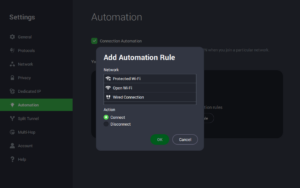
PIA also lets you choose between AES 256-bit and the less-secure AES 128-bit encryption. You can change the configuration method, maximum transmission unit (MTU), remote ports and local ports. While this level of customizability is great for experienced VPN users, newbies should stick to the default options.
In addition to AES 256-bit encryption, ExpressVPN supports ChaCha20 with the Lightway protocol.
We did a series of DNS leak tests to determine whether these protocol-encryption combinations create water-tight VPN tunnels and whether the built-in DNS leak protection works. Thankfully, all VPN combinations came out clean, and none had DNS or IP leaks. Learn more about DNS leaks in our guide to DNS leaks.
Kill Switch
The kill switch is an additional security feature that ensures always-on protection. It cuts the internet connection when the VPN connection drops to prevent accidental leaks. Learn more in our VPN kill switch guide.
Both ExpressVPN and PIA come with a VPN kill switch. In addition to the VPN kill switch, Private Internet Access has an advanced kill switch, which prevents you from connecting to the internet unless the VPN is on.
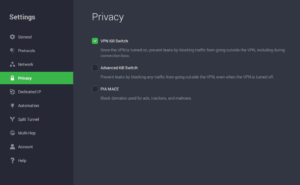
Perfect Forward Secrecy
Perfect forward secrecy (PFS) is another security feature tied to VPN encryption, specifically encryption keys (learn more in our VPN encryption guide). PFS generates new encryption keys randomly or when you terminate a VPN connection. If a hacker or malicious snooper gets a hold of one key, they can’t use it to decrypt your past or future traffic.
Unlike PIA, ExpressVPN uses perfect forward secrecy to protect long and short VPN sessions. It generates a new key when you terminate a VPN session or after every 15 minutes — whichever is shorter.
Split Tunneling

The split tunneling feature allows you to dictate which apps, websites or IP addresses can access the internet directly and which ones will use the VPN tunnel.
For example, you can play an online game unprotected while routing torrent clients via your VPN’s encrypted tunnel — all while the VPN is connected. ExpressVPN supports app-based split tunneling, whereas PIA lets you split tunnel by app and IP address.
PIA Automation

when the VPN detects a new connection.
Another arrow in PIA’s quiver is connection automation. These automation rules are helpful, especially if you tend to forget to connect your VPN. You can configure PIA to automatically connect when it detects a new WiFi or wire connection.
Privacy
The no-logs policy and the jurisdiction in which the VPN is headquartered matter a lot when it comes to VPN privacy. The best VPNs for privacy adhere to strict no-logs policies and are based in countries with privacy-friendly laws.
ExpressVPN adheres to a strict no-logs policy, meaning it doesn’t collect, store or share user logs, IP addresses, locations or browsing history. It’s also headquartered in the British Virgin Islands — a privacy-friendly country with no mandatory data retention laws.
PIA’s privacy policy doesn’t feature a “no-logs” claim, but states that the provider doesn’t collect or log user traffic. However, PIA’s jurisdiction isn’t ideal from a privacy standpoint. The provider is headquartered in Denver, United States — one of the countries in the Five Eyes surveillance alliance. The silver lining is that PIA has maintained a clean track record of safeguarding user privacy.
Third-Party Auditing
Third-party auditing instills an element of trust in VPN providers. While you would take the provider’s word for it, the VPN architecture and infrastructure should undergo third-party auditing to verify that they don’t retain user data, intentionally or accidentally.
Luckily, both ExpressVPN and PIA have undergone third-party auditing. Deloitte Audit Romania audited PIA in 2022 and confirmed that the provider’s privacy policy and server configurations don’t identify users or log their activities. Cure35 audited ExpressVPN’s no-logs policy and found that it does as it says.
Beyond third-party auditing, Private Internet Access offers open-source transparency. Put simply, PIA apps and clients are open-source, with publicly-available code on GitHub. This means that any IT expert can inspect the code to spot potential vulnerabilities.
RAM-Only Servers
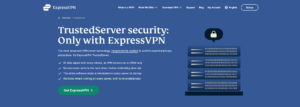
RAM-only servers wipe data the server might accidentally store with every reboot. Even if a hacker overcomes the server’s defense mechanism to install a backdoor that diverts user traffic, it would be washed away when the server is powered off and on again.
Both ExpressVPN and Private Internet Access VPN have switched to RAM-only servers. ExpressVPN labels its RAM-only architecture as TrustedServer, but that’s just a marketing term — the servers work the same as PIA’s RAM-only servers.
PIA MACE And ExpressVPN Threat Manager
ExpressVPN and PIA offer Threat Manager and MACE, respectively. PIA’s MACE filters out ads, trackers and malware, allowing you to enjoy an interruption-free web experience. Threat Manager is only capable of blocking app trackers.
Server Locations & Specialized Servers
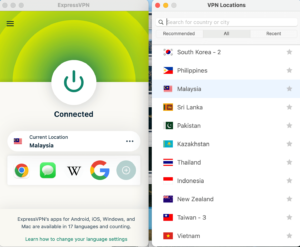
There are two vital aspects when it comes to VPN servers: the server spread and count. The wider the spread, the larger the pool of country-specific IP addresses. The server count matters, too: A higher count prevents server overcrowding in specific locations, thus improving performance.
Private Internet Access has servers in 84 countries. Unfortunately, PIA keeps the information about its server count to itself.
ExpressVPN takes a transparent approach with its server architecture. The provider offers thousands of servers across 152 locations in 94 countries, which is one of the best server spreads on the VPN market.
ExpressVPN and PIA’s server architectures feature a blend of virtual and physical servers. Again, ExpressVPN is forthright about using virtual servers; the provider makes the list of virtual servers available to the public.
PIA Multihop
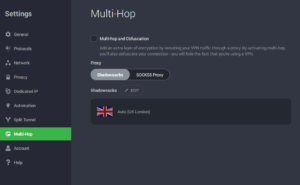
Besides the regular servers, PIA VPN offers multi-hop obfuscated servers. Ordinarily, multi-hop servers route your traffic through two VPN servers — both the entry and exit servers are VPN servers.
Multi-hop on PIA works differently, though. It sends your traffic through a VPN server and a proxy, which can be a Shadowsocks or SOCKS5 proxy. The proxy acts as the entry node and the VPN server acts as the exit node. Just bear in mind that, while a proxy changes your IP address, it doesn’t encrypt your traffic.
Obfuscation Servers
PIA’s multi-hop connection also blends your VPN traffic with regular internet traffic, allowing you to use the VPN in restrictive regions without getting noticed. ExpressVPN builds obfuscation into every server.
Dedicated IPs
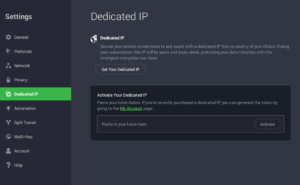
Private Internet Access offers dedicated IP addresses in the U.S., the U.K., Canada, Australia and Germany. The dedicated IPs come at an extra cost, depending on your pricing plan. You pay $5 per dedicated IP on the monthly plan, $4.25 per month on the annual plan or $2.50 per month on the three-year plan.
The good thing is that PIA uses a token-based system when assigning dedicated IPs. As a result, the dedicated IP isn’t tied to your email, so no government agency or malicious snoopers can trace any online activity back to you. Learn more about dedicated vs shared IPs in our best VPN with dedicated IPs guide.
Plans & Pricing
ExpressVPN delivers top-of-the-line performance in nearly all categories. Predictably, it’s more expensive than PIA, which made it onto our list of the best cheap VPN providers.
On a monthly scale, Private Internet Access costs $11.95, a dollar cheaper than its competitor. ExpressVPN offers a six-month plan, which costs $9.99; PIA doesn’t offer a six-month plan, instead focusing on longer-term ones.
Both providers offer a one-year plan. Again, Private Internet Access’ is more affordable, costing $3.33 per month compared to ExpressVPN’s $6.66 — this is ExpressVPN’s best deal. PIA’s best offer is the three-year plan, which costs $2.19 per month.
PIA recently abolished the 10 simultaneous connection cap. The provider now supports unlimited simultaneous connections, joining a growing list of the best VPNs for multiple devices. ExpressVPN allows five simultaneous connections.
Which Is Better: PIA vs ExpressVPN?
There’s no doubt that ExpressVPN is better than Private Internet Access. The BVI-based provider dominates many categories, including security, privacy, connection speed and streaming.
PIA showed traits of a top-tier VPN, with unique tools such as connection automation, dedicated IPs, multi-hop connections and unlimited simultaneous connections. Sadly, the rough edges deny PIA a spot in the upper echelon alongside ExpressVPN and NordVPN. The multi-hop and connection speed could use some sprucing up to propel PIA to the top tier.
ExpressVPN’s all-around performance makes it apt for any task you throw at it, from streaming and torrenting to bypassing censorship. The same can’t be said about Private Internet Access, but if you need a VPN for a large household, the unlimited simultaneous connections sways the odds in PIA’s favor.
We Recommend PIA if You Want…
- A more pocket-friendly service: Private Internet Access is one of the most affordable VPNs. To put PIA’s affordability in perspective, its one-year plan is cheaper than ExpressVPN’s.
- To split the bills with roommates or friends: PIA supports unlimited simultaneous connections, to protect all your devices with one account.
- Always-on automation: PIA’s connection automation enables you to configure the app to connect when it detects a new network.
We Recommend ExpressVPN if You Want…
- Faster, interruption-free streaming: ExpressVPN offers excellent unblocking ability and fast connection speeds for lag- and buffering-free streaming.
- To bypass censorship in restrictive regions: ExpressVPN’s built-in obfuscation lets you use the VPN in countries where VPNs and anonymizers are banned.
- To access geo-restricted content: With thousands of servers in 94 countries, ExpressVPN gives users a large pool of IP addresses to access content in different countries.
If You Want to Consider Other Services, Check Out…
ExpressVPN and Private Internet Access are leading VPN services, but as we have seen, each provider has its strengths and weaknesses. If none of the VPN services meet your needs and preferences, be sure to check out our other top VPN suggestions.
-
1
- : PayPal, Credit card, Google Pay, AmazonPay, ACH Transfer, Cash
- : 6
- :
- :
- :
- :
Average speedDownload Speed94 MbpsUpload Speed9 MbpsLatency6 ms -
2
- : PayPal, Credit card
- : Unlimited
- :
- :
- :
- :
Average speedDownload Speed94 MbpsUpload Speed9 MbpsLatency3 ms -
3
- : Credit card
- : 5
- :
- :
- :
- :
-
4
- : PayPal, Credit card, Bitcoin, cash
- : 10
- :
- :
- :
- :
-
5
- : PayPal, Credit card
- : Unlimited
- :
- :
- :
- :
Average speedDownload Speed96 MbpsUpload Speed9 MbpsLatency127 ms
The Verdict: Why We Think ExpressVPN Wins
The winner of the ExpressVPN vs Private Internet Access comparison is a no-brainer. ExpressVPN put in a performance Private Internet Access can only dream of in key categories: speed, streaming, server spread, security and privacy.
However, PIA didn’t go down without a fight; it offers features you don’t get with our winner. PIA supports connection automation, dedicated IPs, multi-hop connections and unlimited device connections to cement its position as a mid-tier provider. PIA is also cheaper than ExpressVPN.
What do you think of our Private Internet Access vs ExpressVPN comparison? Is there a vital feature of either provider we left out? Which feature sways your decision most when picking a VPN service? We’d like to hear about it in the comment section. As always, thanks for reading.
FAQ: PIA vs ExpressVPN Compared
-
Overall, PIA is not better than ExpressVPN. However, it outshines ExpressVPN on the unlimited simultaneous connections, VPN automation, pricing and dedicated IPs fronts.
-
No, PIA is not the strongest VPN. There are better services in the VPN industry, such as ExpressVPN, NordVPN and Surfshark.
-
Overall, there’s no better VPN than ExpressVPN. It does have shortcomings, such as its high price and its second-fastest speeds, but its overall performance is hard to beat.
-
ExpressVPN’s major downside is the hefty price. The VPN is pricey but delivers one of the most consistently-great experiences, thanks to its all-around performance.
The post ExpressVPN vs PIA in 2023: Premium Features vs Low Cost appeared first on Cloudwards.


